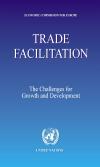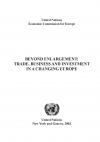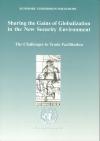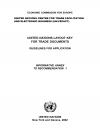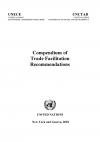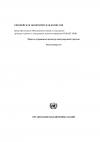Publications
Displaying Results 61 - 80 of 88
ECE/TRADE/354 Trade Facilitation: Sharing the Gains of Globalization in the New Security Environment
- English
This publication, based on two previous UNECE publications (ECE/Trade/330 and ECE/Trade/299), offers to the Russian-speaking audience, a review of main current trade facilitation issues, such as promoting trade facilitation in the new security environment and encouraging the fair distribution of the gains from trade facilitation activities.Readmore
- English
Addresses the income distribution impact of trade facilitation in developing countries. The matter is considered from a general perspective, drawing on economic analysis and practical experience to construct a broad framework to explain the links between trade facilitation, income distribution and poverty Readmore
- English
Consists of papers prepared for the International Forum on Trade Facilitation in May 2002. It includes contributions from organizations and businesses around the world, with an interest in trade facilitation, regarding their views and practical concerns on trade facilitation in the new global environment. Readmore
- English
Based on the presentations and contributions to the Workshop on Trade, Business and Investment in a Wider Europe on 7 April 2003 and also documents and papers relating to the topic. The publication presents to policy makers the opportunities for further economic integration within the region after the EU enlargement of 2004. It also confronts non-acceding countries with some issues that
- English
Outlines the key activities that will be undertaken in the UNECE’s traditional areas of standards development and maintenance, and new and strengthened activities in areas such as implementing trade facilitation instruments and assisting in trade policy development to address the needs of an expanded European economic space, sustainable development and ICT for development
- English
Contains contributions from representatives of UNECE, EU, WTO, WCO and the World Bank among others. The aim is to deal with the questions of how best to ensure that the rewards of global trade facilitation are shared fairly, and how to avoid reversals in the achievements of trade facilitation due to the increased security required in recent years
- English
Intended to offer a useful aid to all parties engaged in the creation and preparation of trade documents with the aim of continuing to reduce the cost and enhance the flow of international trade.Download : ECE/TRADE/270
- English
Intended to be used as a reference by those engaged in simplifying, harmonizing and rationalizing trade procedures and practices. It is also useful for industry, commerce, transport, administrations and organizations, to create awareness of the possibilities that exist in the area of facilitation and harmonization of trade and transport
- English
Attempts to describe briefly the most common and most severe challenges that landlocked countries face. It examines the transit issues and the legal and institutional framework and outlines the role of government. It also gives examples and illustrates by case studies how certain countries or organizations have managed to overcome certain constraint.This overview paper (TRADE/2002/23) will
- English
Explains what is meant by the term “Trade Facilitation”. It also briefly outlines the benefits both to governments and to the business community in terms of increased economic efficiency, better security, faster delivery of goods and reduced costs.The two chapters in Part One introduce the main issues set forth in this book. The first one, “The Policy Debate on Trade Facilitation”,
- English
Presents the opportunities offered by the e-services sector and the policy issues that need to be addressed in order to create a viable enabling environment to support the shift from industrial to service sectors. It also highlights the need for a highly qualified workforce to take advantage of the new openings and aims to help potential investors to manage the risks inherent in trade in
- English
Provides a comprehensive set of recommendations regarding international best practices and standards for the facilitation and harmonisation of trade transactions, from initial commercial documents to payment measures, official controls and transportation of goods. The document reflects recent changes in trade practice, as well as the ongoing changes brought about by the adoption of e-
- English
Explains what is meant by electronic commerce and addresses the issue of the convergence of business and technology and the work of the UN/CEFACT towards electronic business. It also outlines the importance of the simplification of administrative constraints and provides examples of the use of electronic commerce to improve administration
Европейская экономическая комиссия ООН (ЕЭК ООН) имеет давнюю традицию предоставления руководств по упрощению процедур торговли, особенно на тему «Единого окна». С момента своего появления в 2004 году, Рекомендация № 33 о внедрении «Единого окна», была широко принята в качестве ориентира по данному вопросу. Она используется как основа для работы многих других организаций, а также берется за
La Commission économique pour l'Europe (CEE) propose depuis longtemps des orientations en matière de facilitation des échanges, en particulier sur le guichet unique. Depuis son apparition en 2004, la Recommandation 33 sur la mise en place d'un guichet unique a été largement perçue comme référence sur le sujet et sert de base au travail de nombreuses autres organisations ainsi qu'à la pierre
ECE/TRADE/354 Trade Facilitation: Sharing the Gains of Globalization in the New Security Environment
Рекомендация и руководящие принципы по созданию механизма "единого окна" для улучшения эффективного обмена информацией между торговыми организациями и государственными органами РЕКОМЕНДАЦИЯ № 33
Recommandation et lignes directrices en vue de la mise en place d’un guichet unique pour rendre plus efficaces les échanges d’informations entre les opérateurs commerciaux et l’Administration Recommandation No 33
Рекомендация № 1 "Формуляр-образец Организации Объединенных Наций для внешнеторговых документов", приложением к которой является настоящий документ, была утверждена Рабочей группой по упрощению процедур международной торговли ЕЭК ООН в 1973 году. Подробная история разработки Формуляра-образца (ниже именуемого "ФОООН") содержится в тексте Рекомендации и может быть кратко
La Recommandation no 1 intitulée «Formule cadre des Nations Unies pour les documents commerciaux», dont le présent document constitue une annexe, a été adoptée en 1973 par le Groupe de travail de la facilitation des procédures du commerce international de la CEE ONU. Un compte rendu détaillé de la création de la Formule cadre (ci après désignée par l’abréviation «FCNU») figure dans le texte de



